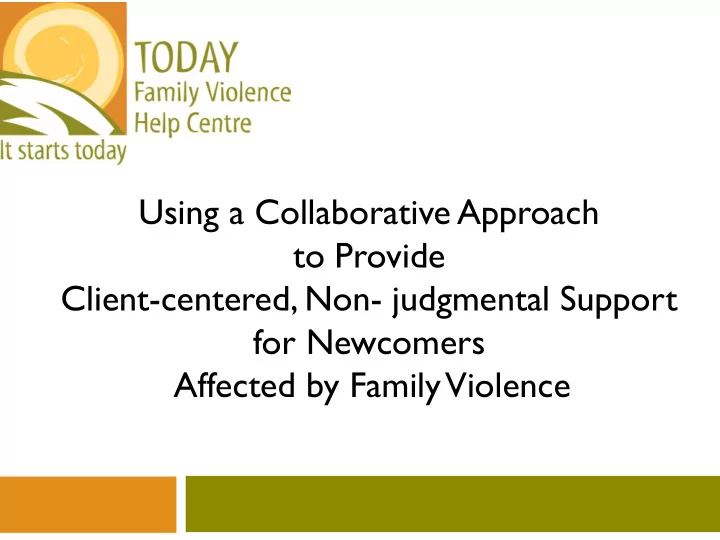

Using a Collaborative Approach to Provide Client-centered, Non- judgmental Support for Newcomers Affected by Family Violence
T oday Centre – The Beginning 2 ▪ Today Family Violence Help Centre is the result of considerable community planning efforts. ▪ Planning started in 2004 with 25 different stakeholders including city of Edmonton, AB Government and Community Organizations. ▪ Opened its doors in 2009 ▪ Vision: “A Healthy Community Safe and Free of Family Violence” ▪ Mission: “T o provide inclusive integrated community -wide services for those impacted by family violence.”
The Dream At a time of great trauma victims of domestic violence will find: An easily accessible, nurturing environment where their needs can be met in one place, in a timely way. The Today Centre will connect with current services, initiatives and systems to work together to strengthen responsiveness to clients.
What Families and Individuals T old Us Past clients identified: Feeling emotionally drained and humiliated by of stories many times feel confused and frightened being during interviews Feeling frustrated with children to access services and then having to wait for a long time A and help to access systems they needed ... A fear of ‘spiraling into poverty’
T oday Centre Aim to: Serve individuals from diverse cultures impacted by family violence Provide seamless, culturally appropriate access to services in a safe secure environment Provide enhanced coordination between professionals , agencies and systems to better serve people impacted by family violence Ensure services include early intervention, prevention, assessment, treatment and referral
What do we do? Client support short-term, client centered support Community Support Provide information about community resources, consult regarding how to work with a client, how we can work together Linking Protocols Smooth transition for clients Maintain a long-term relationship between agencies Community Partners and Co-located agencies Last quarter referred to 122 agencies, 691 referrals in total Education Program
How we support clients 7 ▪ Providing a safe environment for clients to tell their stories. ▪ Emotional support for clients in determining level of risk ▪ Working with them to develop a safety plan for themselves and their family ▪ Educating about family violence and it’s impacts ▪ Connecting with appropriate community resources and supports ▪ Supporting clients and their decisions about what steps to take next
Meet clients where they are at In relationship, leaving the relationship or after they have left, all individuals require unique support for their unique situation. Stages of Change Model Pre-contemplation- Education about DV, assess level of risk, develop safety plan for staying safe while living with an abusive person Contemplation- non-judgemental emotional support for clients who feel ambiguous about the relationship, offer RA and SP for where they are at.
Stages of change cont. Preparation- Assist clients to make a plan which is unique to their situation, gives them choice and informs them about different options. Risk Assessment, Safety plan. Action- Empower clients to complete the actions that they are able, and provide support and referral to other services. Risk Assessment, Safety plan. Maintenance- May involve continued safety planning, legal orders, referral to long-term counselling or outreach programs.
Complexity of situations for Newcomers May include: Language barriers Pressures from broader community Cultural differences Immigration status Limited understanding of law and rights Pre-migration trauma Change in socio- Limited social support economic status limited knowledge of Poverty community resources Immigration abuse Family context
Ethno-Cultural Family Violence Specialist Due to the complexity, additional support is needed for some ethno-cultural clients. IRCC provides funding for an Ethno-Cultural Family Violence Specialist (ECFVS) ECFVS has more flexibility in the support they can give to clients. ECFVS is able to work with clients for longer, meet them in the community and provide more advocacy then our non- ethno-cultural FVS program.
Monthly Case Consultation Participants include: ASIST Responding to DV in Chinese Community Multicultural Health Brokers Coop Indo- Canadian Women’s Association Islamic Family Social Services Alberta Works (income support) Health For Two City of Edmonton- Individual and Family Wellbeing program CSS Cross Cultural counsellors CSS Family Violence Outreach WIN house Outreach workers, Intensive Case Counsellors Lives in Transitions (employment program for DV)
Public Education 13 Education Program ▪ Family & Friends: How to Help Someone Impacted by FV ▪ 2 Day Family Violence for Professionals ▪ Family Violence in the Workplace ▪ Workshops and Seminars for Service Providers ▪ Agency tours ▪ E-Newsletter
It Starts Today Client Resource Booklet Available at the resources table and at www.thetodaycentre.ca This resource helps victims of domestic violence with information about understanding DV, how to keep you and your family safe, basic information about the justice and legal system and local supporting resources.
Connect with us! 15 Twitter @TodayFV www.todaycentre.ca Facebook
Recommend
More recommend